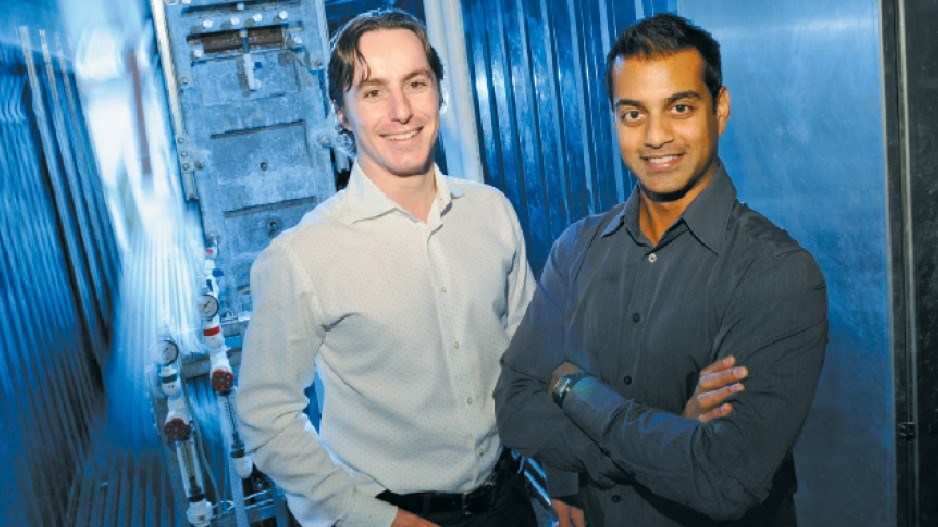When a foreign trade mission comes to B.C. looking to ink deals with local businesses, the top official is usually a government minister.
Last week, Luxembourg not only sent its foreign trade minister to Vancouver, it also sent its crown prince to help sell the tiny European country as a gateway to Europe, where there is a growing demand for B.C.-developed clean technology.
The trade mission reinforces B.C.’s reputation for punching above its weight class in the renewable energy and eco-tech sectors. But B.C.’s 220 pure play clean-tech companies may be at a crossroads.
A growing worldwide demand for clean technology is creating new opportunities for B.C. innovators.
But that demand is also creating increased competition, with China rapidly dominating the solar, wind and LED manufacturing sectors. There is an equally fierce competition for limited investment dollars.
Venture capitalists are reluctant to invest in Canadian clean-techs, and clean-tech investment analysts say the public markets are equally blasé. A number of anticipated IPOs by Canadian clean-techs have failed to happen, due to a lack of investor interest, according to Graeme Falkowsky, managing director of corporate finance at Deloitte Canada.
As the more successful B.C. clean-tech companies have discovered, corporate investment in the form of joint partnerships, mergers and acquisitions provides a good alternative to traditional financing models for companies needing investment to fund R&D and growth.
Westport Innovations (TSX:WPT), Saltworks Technologies, Ballard Power Systems (TSX:BLD) and Nexterra Systems Corp. are a few of B.C.’s clean-techs that have struck strategic partnerships with large corporations to fund their growth.
“A lot of the big multinationals have a lot of cash on their balance sheets, and they see clean tech as a way – [through] acquisitions, investments, joint ventures – to grow their businesses,” said Nexterra founder Jonathan Rhone, who chairs the Clean Tech CEO Alliance.
Nexterra’s partnership with General Electric Co. (NYSE:GE) on a $27 million biomass cogeneration plant at the University of British Columbia is a good example. The project will use Nexterra biomass gasification technology and GE generators.
Westport, meanwhile, has grown from 10 employees to nearly 1,000 through a series of strategic partnerships with major equipment manufacturers like Cummins Inc. (NYSE: CMI) in the U.S. and Weichai Power Co.in China. While the biggest markets are outside of Canada, there are domestic opportunities in the mining, oil and gas industries for companies involved in the so-called “cleanup-tech” subsector (carbon sequestration, effluent remediation, etc.)
B.C. companies are particularly well positioned for that subsector because Vancouver is a mining hub, while Canada’s oil and gas hub – Calgary – is just next door.When Saltworks was trying to commercialize its water desalination process, the Vancouver startup didn’t even bother trying to woo venture capitalists. The company approached Cenovus Energy (TSX:CVE), a $24 billion oil and gas company, which last year invested $2.5 million in Saltworks.
“Rather than being VC funded, we’re corporate funded,” said Saltworks CEO and co-founder Ben Sparrow. “Venture capitalists are motivated by a return on their investments. Corporates tend to have a longer, more patient investment time horizon, as opposed to looking for a quick exit.”
Another option for small clean-tech companies is to position themselves for acquisition. Many large multinationals have been turning to acquisitions as an alternative to doing their own in-house research and development.
“Among large corporations, there is what I call an arms race going on to acquire the most successful clean-tech companies,” said Wal van Lierop, CEO of Chrysalix Energy Venture Capital.
But he adds that B.C. clean-techs also need to look beyond Canada when seeking corporate partnerships, because the largest markets are outside North America.
“Go beyond Toronto,” he said. “If you only look at what’s happening in Canada, you will fail – guaranteed.”
Despite the current political instability and economic uncertainty, Europe is still a good place for Canadian clean-tech companies to consider investing in, according to Luxembourg Economy and Foreign Trade Minister Etienne Schneider.
Luxembourg (population 510,000) has been diversifying its economy by focusing on “eco-tech,” information and communication technology (ICT), life sciences and logistics.
Biofuel technology is one area of opportunity for B.C. companies in Luxembourg itself, Schneider told Business in Vancouver, and the country is geographically well positioned on the borders of Germany, France and Belgium to provide gateway access to the rest of Europe.
One of the hazards of doing business in Europe, however, is that subsidies like feed-in tariffs have created an artificial demand for technology like wind and solar power, and when the subsidies end, it can be fatal, as Vancouver’s Day4 Energy (TSX:DFE) has learned. Day4’s stock is now virtually worthless, and the company faces delisting on the TSX, thanks to a sudden glut of cheap solar photovoltaic products – a glut created in part by subsidies that are now being scrapped.
While Luxembourg’s economy is strong and its standard of living high, the uncertainty that hangs over the European Union means potential investors are likely to take a wait-and-see approach, said corporate finance consultant Rick Peterson.
“The combination of very poor capital markets, austerity programs and government cutbacks in Europe would make any proposition extremely difficult now,” he said. “I don’t know the Luxembourg situation, but in the context of the poor capital markets and poor European situation, that’s going to be a tough row to hoe.”•




